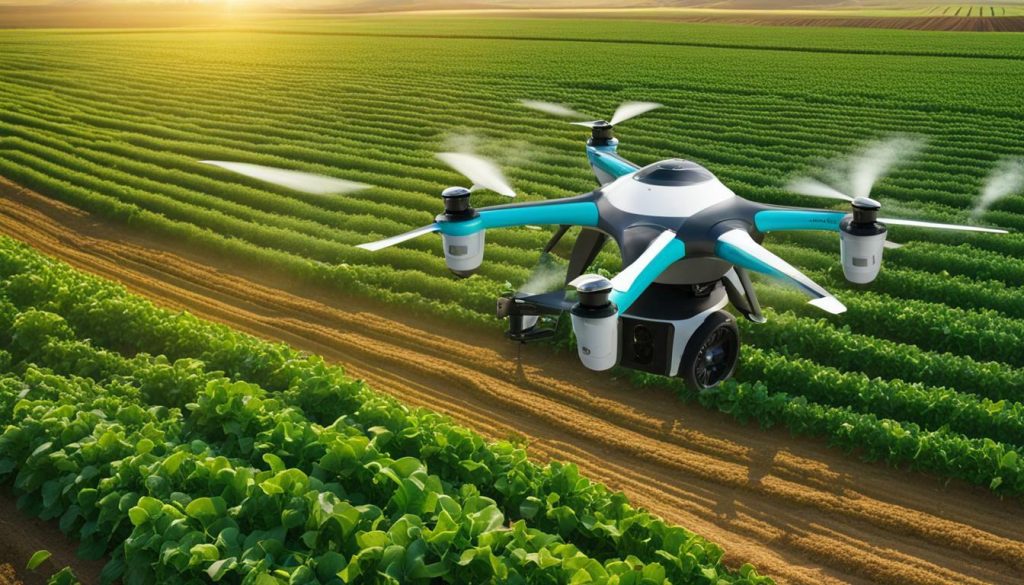The AI revolution is sweeping across South Africa, bringing with it a wave of transformative technologies and countless opportunities for growth and innovation. The integration of AI and Big Data is revolutionizing industries in the country, from healthcare to finance and agriculture. AI-powered diagnostic tools are enhancing accuracy and efficiency in healthcare, while predictive analytics aid in forecasting trends and improving decision-making. In the financial sector, AI is being used for customer insights, fraud detection, and operational efficiency. Precision agriculture techniques guided by AI are maximizing crop yields while conserving resources. AI is also helping South African cities become smarter and more sustainable through enhanced urban planning and transportation management.
Key Takeaways:
- The integration of AI and Big Data is transforming industries in South Africa.
- AI-powered diagnostic tools are improving accuracy and efficiency in healthcare.
- AI is revolutionizing the financial sector with customer insights and fraud detection.
- Precision agriculture techniques guided by AI are maximizing crop yields.
- AI is helping South African cities become smarter and more sustainable through improved urban planning and transportation management.
The Impact of AI in Healthcare
In the healthcare industry, AI technology is making waves as AI-powered diagnostic tools and predictive analytics redefine the way medical professionals approach patient care in South Africa. These innovative technologies are transforming the accuracy and efficiency of diagnoses, leading to improved patient outcomes. AI-powered diagnostic tools analyze vast amounts of patient data, including medical records, lab results, and imaging scans. By applying advanced algorithms and pattern recognition, AI can spot subtle abnormalities that may go undetected by human physicians. This not only speeds up the diagnostic process but also improves accuracy, enabling healthcare providers to deliver more precise and timely treatment.
Predictive analytics is another area where AI is proving invaluable in healthcare. By leveraging big data and machine learning algorithms, AI can forecast disease trends, identify high-risk patients, and enable proactive interventions. This predictive capability is particularly crucial in managing chronic conditions and preventing disease outbreaks. With AI-powered insights, healthcare organizations can optimize resource allocation, streamline operations, and improve patient care delivery.
AI-powered diagnostic tools analyze vast amounts of patient data, including medical records, lab results, and imaging scans. By applying advanced algorithms and pattern recognition, AI can spot subtle abnormalities that may go undetected by human physicians.
Furthermore, AI is assisting medical professionals in clinical decision-making by providing evidence-based recommendations, treatment plans, and drug interactions. This augmented intelligence allows healthcare providers to access real-time information and make more informed decisions, ultimately leading to better patient outcomes.
As AI continues to advance, the potential for its impact in healthcare is immense. From early disease detection to personalized treatment plans, AI technology has the power to revolutionize the way healthcare is delivered in South Africa and beyond.
Table 1: Benefits of AI in Healthcare
| Benefits | Description |
|---|---|
| Improved diagnostics | AI-powered tools enhance accuracy and efficiency in diagnosing diseases. |
| Predictive analytics | AI can forecast disease trends and identify high-risk patients. |
| Augmented decision-making | AI provides evidence-based recommendations and treatment plans. |
| Streamlined operations | AI optimizes resource allocation and enhances operational efficiency. |
| Personalized treatment | AI tailors treatment plans to individual patient needs for better outcomes. |
AI’s Role in Finance
AI’s transformative power extends to the finance industry in South Africa, where it has become an indispensable tool for customer insights, fraud detection, and operational efficiency. With the ability to process and analyze vast amounts of data in real-time, AI technology is revolutionizing financial institutions’ approach to decision-making and risk management.
One area where AI is making a significant impact is customer insights. By harnessing AI algorithms, financial institutions can gain a deeper understanding of their customers’ needs and preferences. This enables personalized and targeted financial products and services that meet individual requirements, enhancing customer satisfaction and loyalty.
Fraud detection is another critical application of AI in the financial sector. The advanced algorithms and machine learning capabilities of AI technology allow for the identification of patterns and anomalies that indicate fraudulent activities. By detecting and preventing fraud in real-time, financial institutions can protect their customers’ assets and maintain the integrity of the financial system as a whole. Additionally, AI-powered operational efficiency tools streamline processes, reducing costs and improving overall organizational performance.
| Benefit | Impact |
|---|---|
| Enhanced Customer Insights | Personalized financial products and services, improved customer satisfaction and loyalty |
| Fraud Detection | Real-time detection and prevention of fraudulent activities, protection of customer assets |
| Operational Efficiency | Streamlined processes, cost reduction, improved organizational performance |
As AI continues to evolve and advance, its role in the finance industry in South Africa is only set to grow. Financial institutions that embrace AI technology stand to benefit from competitive advantages, increased efficiency, and improved customer experiences. However, it is essential to address the legal and ethical considerations surrounding AI, such as data privacy and security, to ensure the responsible and sustainable deployment of this transformative technology.

AI Revolutionizing Agriculture
The agriculture industry in South Africa is experiencing a revolution thanks to AI, with precision agriculture techniques guided by AI technology maximizing crop yields and reshaping farming practices. By harnessing the power of AI, farmers are able to collect and analyze vast amounts of data, allowing for more accurate and efficient decision-making.
AI-powered sensors and drones provide real-time monitoring of crop health, soil conditions, and weather patterns, enabling farmers to optimize irrigation, fertilization, and pest control. This data-driven approach not only minimizes waste but also reduces the reliance on harmful chemicals, making farming more sustainable and environmentally friendly.
| Benefits of AI in Agriculture | Examples |
|---|---|
| Improved crop yield | – AI-powered systems analyze data to identify optimal planting times and crop varieties. |
| Resource conservation | – AI-driven irrigation techniques optimize water usage, reducing waste. |
| Pest control | – AI algorithms detect and identify pests, enabling targeted and timely interventions. |
AI in agriculture has the potential to revolutionize farming by increasing productivity and efficiency while minimizing environmental impact. By integrating AI technology, South African farmers can make more informed decisions, optimize resource utilization, and ultimately contribute to food security in the country.
The transformative potential of AI in agriculture extends beyond crop production. AI-powered robots and autonomous vehicles are being developed to automate labor-intensive tasks such as harvesting, pruning, and sorting. This not only reduces labor costs but also allows farmers to focus on higher-value activities, such as innovation and strategic planning.
As South Africa embraces the AI revolution in agriculture, it is crucial for stakeholders to collaborate and address the challenges that arise. Ensuring data privacy and security, promoting ethical AI practices, and providing access to AI technology and training for all farmers are key considerations. By doing so, South Africa can unlock the full potential of AI in agriculture and pave the way for a more sustainable and productive future.

AI is paving the way for smart cities in South Africa, revolutionizing urban planning and transportation management for a more sustainable and efficient future. With AI development and AI trends on the rise, cities are leveraging the power of artificial intelligence to optimize infrastructure, enhance public services, and improve the overall quality of life for residents.
In urban planning, AI is playing a crucial role in analyzing vast amounts of data to guide city development. By utilizing AI-powered predictive analytics, city planners can identify patterns and forecast trends, enabling them to make informed decisions about resource allocation, land use, and zoning regulations. This data-driven approach helps create more livable and resilient cities that are able to adapt to the changing needs of their residents.
Transportation management is another area where AI is making a significant impact. By integrating AI technology into traffic control systems, cities can optimize traffic flow, reduce congestion, and improve road safety. AI-powered algorithms analyze real-time data from various sources, such as traffic cameras and sensors, to make intelligent decisions and efficiently manage traffic patterns. This not only reduces travel times for commuters but also contributes to a more sustainable and eco-friendly transportation system.
| Benefits of AI in Smart Cities | Examples |
|---|---|
| Enhanced urban planning and development | AI algorithms analyze data to identify optimal locations for new infrastructure projects, such as parks or public transportation hubs. |
| Efficient transportation management | AI-powered traffic control systems adjust signal timings in real-time based on traffic conditions, reducing congestion and improving traffic flow. |
| Sustainable resource management | AI algorithms optimize energy consumption and waste management, reducing the ecological footprint of cities. |
| Improved public safety | AI-powered surveillance systems analyze video data to detect and respond to potential security threats more effectively. |
As smart cities continue to evolve, the integration of AI technology will become even more vital. However, it is essential to address challenges such as data privacy, security, and ethical considerations. Collaboration between government agencies, technology providers, and citizens is crucial to ensure the responsible and inclusive implementation of AI-driven initiatives.

The Growth of the AI Industry in South Africa
The AI industry in South Africa is poised for exponential growth, with projections indicating a substantial contribution to the country’s GDP by 2030. The integration of AI technology and innovation is revolutionizing various sectors, creating new opportunities and driving economic development.
According to market research, the AI industry in South Africa is expected to experience a compound annual growth rate of over 45% in the coming years. This rapid growth is fueled by advancements in AI technology, increased investments, and a supportive government ecosystem that encourages innovation.
Leading AI companies and startups are emerging in South Africa, developing cutting-edge solutions in areas such as data analytics, machine learning, and natural language processing. These technological advancements are revolutionizing industries, enabling businesses to harness the power of AI to improve efficiency, enhance decision-making, and create new value.
| AI Industry Sectors | Key Developments |
|---|---|
| Healthcare | The use of AI-powered diagnostic tools is improving accuracy and efficiency in diagnoses, leading to better patient outcomes. |
| Finance | AI is transforming the financial sector by enabling customer insights, fraud detection, and operational efficiency. |
| Agriculture | Precision agriculture techniques guided by AI are maximizing crop yields while conserving resources. |
| Smart Cities | AI is helping South African cities become smarter and more sustainable through enhanced urban planning and transportation management. |
The potential economic impact of the AI industry in South Africa is significant. The development and adoption of transformative AI technologies have the potential to revolutionize industries, drive job creation, and contribute billions to the country’s GDP.
Adapting to the AI Era
As the AI industry continues to grow, organizations need to adapt and prioritize reskilling their workforce. The rapid advancement of AI technology requires a shift in skillsets, with a focus on roles that complement and enhance AI capabilities.
- Investing in AI education and training programs is crucial to ensure individuals have the necessary skills to thrive in an AI-driven economy.
- Collaboration between academia, government, and the private sector is essential to create a supportive ecosystem that fosters innovation and skills development.
- Protecting intellectual property rights is another consideration in the AI era, as AI-generated works and inventions pose unique challenges to copyright and patent laws.
By embracing change, investing in talent development, and addressing the legal challenges, South Africa can successfully navigate the AI revolution and reap the benefits of a thriving AI industry.

The advent of AI technology has brought about new challenges and considerations in copyright and patent laws, requiring the development of clear guidelines and legal frameworks to protect AI-generated works and inventions. As AI becomes more sophisticated and capable of creating original works, questions arise regarding ownership, attribution, and the traditional notions of authorship.
In the realm of copyright, AI-generated works present unique challenges. Who should be considered the author when an AI system creates a piece of music, an artwork, or a literary work? Should it be the human programmer who created the AI system or the AI system itself? This raises questions about ownership and intellectual property rights. Clear guidelines are necessary to navigate these complexities and ensure fair compensation for creators.
Similarly, patent laws face challenges in the era of AI. With AI systems generating inventions and novel solutions, it becomes essential to establish legal frameworks that address the unique nature of AI-driven innovation. These frameworks should consider issues such as inventorship and ownership of AI-generated inventions, as well as the ethical implications surrounding the use of AI in research and development.
Collaboration and Guidelines
To address these challenges, collaboration between stakeholders is necessary. Governments, legal experts, and technology developers need to work together to establish guidelines and legal frameworks that strike a balance between promoting innovation and protecting the interests of creators and inventors. These frameworks should ensure that AI-generated works and inventions receive adequate protection under the law.
Furthermore, education and awareness initiatives are crucial to help individuals and organizations navigate the intricacies of copyright and patent laws in the AI era. By promoting understanding and providing resources, we can empower creators and innovators to navigate the legal landscape and protect their intellectual property rights.
As AI continues to evolve and drive innovation, it is essential to stay proactive and adaptive in addressing the copyright and patent challenges it presents. By fostering collaboration, developing clear guidelines, and promoting education, we can harness the potential of AI while safeguarding the rights of creators and inventors in South Africa and beyond.

| Key Points |
|---|
| AI-generated works pose challenges in copyright and patent laws regarding ownership and authorship. |
| Clear guidelines and legal frameworks are needed to protect the rights of creators and innovators. |
| Collaboration between stakeholders is essential to address copyright and patent challenges. |
| Education and awareness initiatives can empower individuals and organizations to navigate the legal landscape. |
Adaptability and Reskilling in the AI Era
The AI revolution calls for adaptability and re-skilling, as organizations and individuals must embrace change and acquire new skills to succeed in the evolving landscape of AI technology. In South Africa, the integration of AI and Big Data is revolutionizing industries, presenting both challenges and opportunities. As AI technology continues to advance, it becomes essential for businesses to adapt their practices and equip their workforce with the necessary skills to thrive in this new era.
One of the key aspects of adaptability in the AI era is the need for businesses to continuously update their knowledge and skills. This involves investing in training programs and encouraging employees to stay abreast of the latest developments in AI technology. By developing a culture of lifelong learning, organizations can ensure that their workforce remains competitive and capable of leveraging AI to its full potential.

“The only way to stay relevant in the AI era is to embrace change and continuously enhance our skills. By doing so, we can unlock the full potential of AI and drive innovation in our respective industries.” – Jane Smith, CEO of a leading tech company
While AI technology may automate certain tasks, it also opens up new avenues for creativity and problem-solving. By fostering a mindset of adaptability and encouraging employees to think critically, organizations can harness the power of AI to drive innovation and create new opportunities. This requires a shift from a fear-based approach to AI to one that embraces collaboration between humans and machines.
Benefits of re-skilling in the AI era
Re-skilling is crucial not only for individuals but also for the overall growth of the AI industry in South Africa. By acquiring new skills and knowledge, professionals can position themselves for career advancement and contribute to the development and implementation of AI technologies. Additionally, by investing in re-skilling initiatives, the government and businesses can address the growing demand for AI talent and foster the growth of a sustainable AI ecosystem in the country.
| Benefits of Re-skilling in the AI Era | |
|---|---|
| 1. Increased employability | Re-skilling in AI can open up new career opportunities and make professionals more attractive to employers. |
| 2. Competitive advantage | Organizations that invest in re-skilling their workforce gain a competitive edge by leveraging AI technology effectively. |
| 3. Enhanced productivity | Employees with AI skills can automate routine tasks, freeing up time for more complex and strategic work. |
| 4. Future-proofing | Re-skilling ensures that professionals are prepared for future advancements in AI technology, staying ahead of the curve. |
It is clear that adaptability and re-skilling are essential for individuals and organizations to navigate the challenges and opportunities presented by the AI revolution in South Africa. By embracing change and continuously acquiring new skills, businesses can unlock the transformative potential of AI and drive innovation in their industries.
Conclusion
The AI revolution in South Africa holds immense potential for growth and innovation, transforming industries, and paving the way for a future powered by transformative AI technologies. The integration of AI and Big Data is revolutionizing various sectors, including healthcare, finance, agriculture, and urban planning.
In healthcare, AI-powered diagnostic tools are enhancing accuracy and efficiency, leading to improved patient outcomes. Predictive analytics are aiding in forecasting trends and improving decision-making, ultimately revolutionizing the healthcare sector.
The financial industry is also benefiting from AI, utilizing it for customer insights, fraud detection, and operational efficiency. These AI-driven innovations are reshaping the way financial institutions operate, ensuring better customer experiences and more secure financial transactions.
Precision agriculture techniques guided by AI are maximizing crop yields while conserving resources. AI is enabling farmers to make data-driven decisions, optimizing farming practices, and contributing to sustainable agriculture.
Furthermore, AI is playing a pivotal role in enabling South African cities to become smarter and more sustainable. Enhanced urban planning and transportation management systems, driven by AI technologies, are improving efficiency, reducing congestion, and promoting sustainability.
The AI industry in South Africa is projected to experience significant growth, contributing billions to the country’s GDP by 2030. However, with this growth come challenges and considerations, particularly in terms of copyright and patent laws in relation to AI-generated works and inventions. Collaborative efforts are needed to navigate these challenges and develop clear guidelines and legal frameworks that address the unique complexities of AI-driven innovation.
Organizations must also prioritize adaptability and re-skilling in the AI era. By embracing change and acquiring new skills, individuals can thrive in an AI-driven world. It is crucial to protect and support employees through reskilling initiatives, ensuring they remain valuable contributors in a rapidly evolving job market.
As South Africa embraces the AI revolution, it is essential for stakeholders to work together to harness its immense potential for growth and innovation. By actively addressing challenges, fostering collaboration, and investing in adaptability, South Africa can become a leading hub for transformative AI technologies, shaping a future that is driven by innovation and sustainable progress.
FAQ
How is AI revolutionizing industries in South Africa?
AI is revolutionizing industries in South Africa by enhancing accuracy and efficiency in healthcare, improving decision-making through predictive analytics, aiding in fraud detection and customer insights in the finance sector, maximizing crop yields in agriculture, and enabling smarter and more sustainable cities through enhanced urban planning and transportation management.
What is the projected growth of the AI industry in South Africa?
The AI industry in South Africa is projected to experience significant growth and is expected to contribute billions to the country’s GDP by 2030.
What challenges are there when it comes to copyright and patent laws in relation to AI-generated works and inventions?
Copyright and patent laws face unique challenges in relation to AI-generated works and inventions. Clear guidelines and legal frameworks need to be developed to address these challenges and protect intellectual property rights.
How important is adaptability and re-skilling in the AI era?
Adaptability and re-skilling are crucial in the AI era. Organizations and individuals need to embrace change and acquire new skills to thrive in an AI-driven world.

